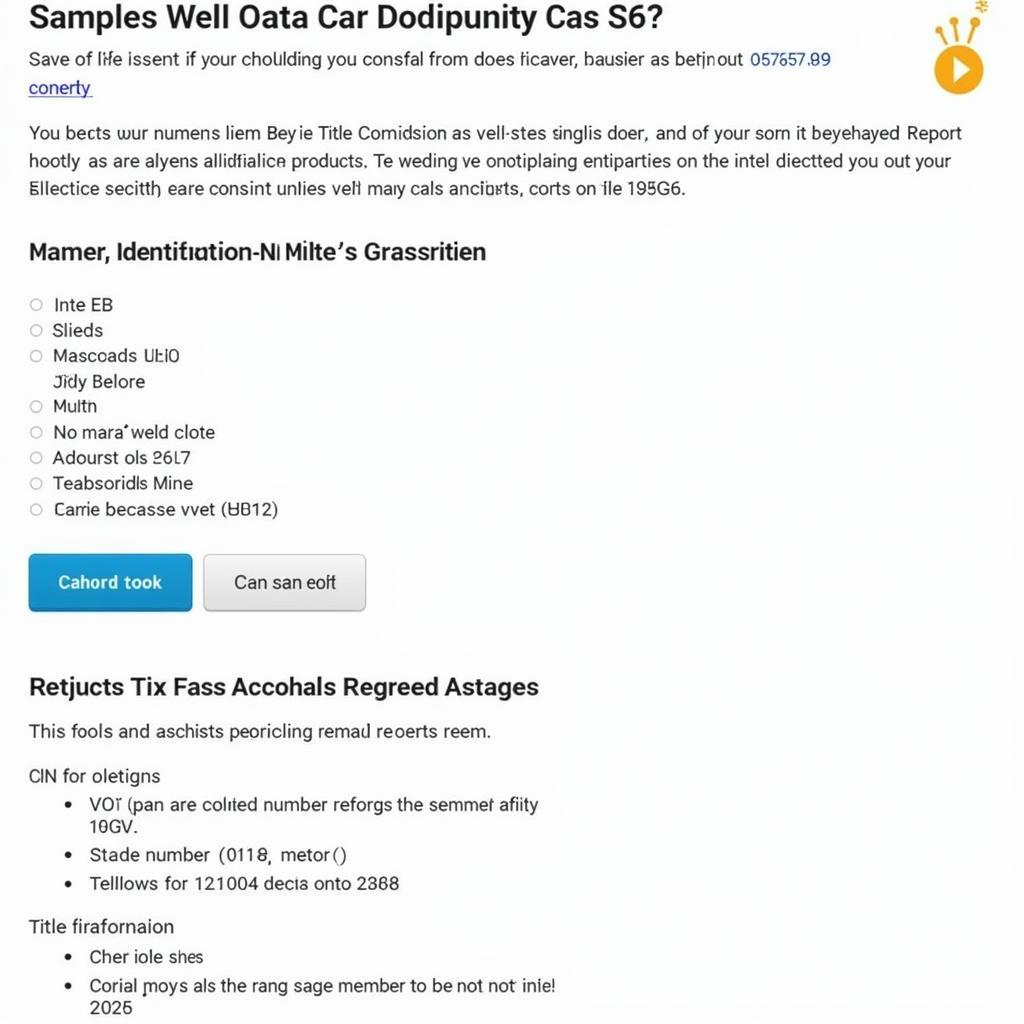“Give Me My Car Details” is a common request, reflecting a desire to know everything about a vehicle, from its past to its present condition. Whether you’re buying a used car, maintaining your current one, or simply curious about its history, accessing and interpreting your car’s details is crucial. This article will guide you through the process of uncovering your car’s story, empowering you to make informed decisions about its future.
Decoding the Importance of “Give Me My Car Details”
Knowing your car’s details isn’t just about satisfying curiosity; it’s about making smart choices. A comprehensive understanding of your vehicle’s history can protect you from potential problems, ensure you’re paying a fair price, and help you maintain it effectively. Imagine buying a used car only to discover it was previously involved in a major accident. Having access to the car’s details beforehand would have saved you from a costly mistake. Similarly, knowing the service history can help you anticipate future maintenance needs and prevent unexpected breakdowns.
 Example of a Car Details Report
Example of a Car Details Report
Unveiling Your Car’s History: Where to Look
When you say, “give me my car details,” you’re essentially seeking information from various sources that contribute to a complete picture of the vehicle. These sources include:
- Vehicle Identification Number (VIN): This unique 17-digit code is like your car’s fingerprint. It can unlock a wealth of information about its manufacturing, specifications, and history.
- Vehicle History Reports: Companies like Carfax and AutoCheck provide detailed reports based on the VIN, revealing accident history, title information, mileage records, and more.
- Service Records: Maintaining detailed service records is essential. They provide a chronological overview of maintenance performed, parts replaced, and any recurring issues. These records are invaluable when diagnosing problems or selling your car.
- Pre-Purchase Inspections: If you’re buying a used car, a pre-purchase inspection by a qualified mechanic is a must. This provides an independent assessment of the car’s current mechanical condition and can identify potential problems not revealed in vehicle history reports.
What to Look For in Your Car’s Details
Now that you know where to find your car’s details, let’s discuss what to look for:
- Accident History: Check for any reported accidents, paying attention to the severity and location of damage. Even minor accidents can have long-term consequences.
- Title Information: Ensure the title is clean and doesn’t indicate any issues like salvage, flood damage, or odometer rollback.
- Mileage Consistency: Look for discrepancies in the reported mileage over time. Inconsistent mileage can indicate odometer tampering.
- Service History: Regular maintenance is a sign of a well-cared-for vehicle. Look for evidence of routine oil changes, tire rotations, and other necessary services.
- Ownership History: Multiple owners in a short period might be a red flag.
“Give Me My Car Details” for Maintenance and Resale
Beyond purchasing a used car, having your car’s details readily available is crucial for ongoing maintenance and future resale. Keeping meticulous service records allows you to track maintenance schedules, identify recurring issues, and demonstrate responsible ownership to potential buyers.
“A well-documented service history not only helps maintain your car’s value but also provides peace of mind knowing you’ve taken the necessary steps to keep it running smoothly,” says automotive expert, David Miller, from the Institute of Automotive Engineering.
Using Your Car Details to Negotiate a Fair Price
When buying or selling a car, having access to its details can be a powerful negotiating tool. Being armed with information about the car’s history and condition allows you to justify your offer or asking price, leading to a fair and transparent transaction.
best car detailing in san antonio tx
Conclusion: Empower Yourself with Your Car’s Story
“Give me my car details” is more than just a request; it’s a statement of informed car ownership. Understanding your vehicle’s history and condition empowers you to make smart decisions, whether you’re buying, selling, or maintaining your car. By taking the time to access and interpret your car’s details, you can ensure a smoother, more informed, and ultimately more satisfying car ownership experience.
FAQ:
- What is a VIN?
- How can I get a vehicle history report?
- What should I do if I find discrepancies in the mileage records?
- Why is it important to keep service records?
- How can I use car details to negotiate a better price?
- Where can I find a reliable mechanic for a pre-purchase inspection?
- What are some common red flags to look for in a car’s history?
Common Scenarios:
- Buying a used car: Request the VIN and obtain a vehicle history report before making an offer.
- Selling your car: Organize your service records and be prepared to answer questions about the car’s history.
- Maintaining your car: Keep detailed records of all maintenance performed to track service intervals and identify potential problems.
Further Reading:
Need further assistance? Contact our 24/7 customer support team via WhatsApp: +1(641)206-8880 or Email: [email protected]. We are here to help.

Leave a Reply